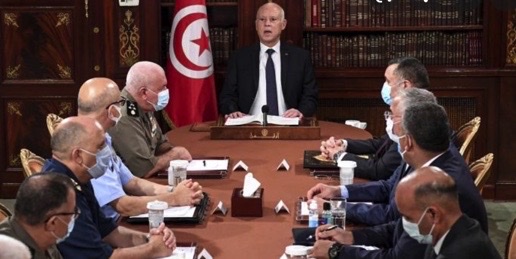It is the second night of curfew, Tunisians are reliving the days of the revolution of ten years ago when they took to the streets to rebel and try to solve the atavistic problems that have always gripped the country, from high unemployment to the degradation of public infrastructures. Problems that, apparently, have never been addressed and resolved, today more acute due to the perennial economic crisis, amplified by the pandemic in progress.
The Tunisian president Kais Saied he asks calmly and says to his people: "I don't want to see even a drop of blood, don't give in to provocations ". There is also strong international concern for the situation which, in the eyes of analysts, appears very uncertain and unpredictable. The European Union and the United States invite the "Respect for democracy" while Italy is moving towards a European coordination with France, Germany , Spain. Our Foreign Minister, Luigi Di Maio he commented on the situation thus giving impetus to community coordination: “It is important that this situation is treated with the utmost attention at the European level”. The High Representative of the EU Joseph Borrel, "Recalling the considerable support of the European Union and its Member States for Tunisia, in the context of a serious pandemic and economic crisis" states that "preserving democracy and the stability of the country are priorities ".
The situation in Tunisia degenerated Sunday evening when President Saied, invoking the Constitution, sacked the premier and suspended parliament for 30 days. These days he is trying to foster national dialogue by involving all existing political forces, and beyond. As Ansa writes, it saw the leaders of the powerful UGTT trade union who limited themselves to asking for compliance with constitutional guarantees. Then also the Tunisian League of Human Rights, Utica (the local Confindustria) which had already played a fundamental role in the 2013 National Dialogue. And, again, the National Union of Journalists (Snjt) and the Tunisian Rights Forum socio-economic (Ftdes). Saied then met with the heads of the judiciary and the various trade associations, before starting the round of consultations with the parties.
Saied is looking for that national dialogue to which the Islamic party Ennhadha, the first force in Parliament and the most penalized by the move of the president, has also called, but continues to ask him to step back to overcome the crisis, respecting the "democratic choice ”Of the population and allowing the elected Parliament to resume work. A step backwards is also addressed to the president by the National Magistrates Association, which asks for "the urgent revocation of the exceptional measures adopted and the disclosure of the mechanisms for resuming the democratic path that guarantees rights and freedoms and the normal functioning of state institutions".
In the meantime, jurists continue to question the constitutionality or otherwise of Saied's move, given the decisive absence in the country of the Constitutional Court, provided for in the 2014 Charter but never established.
Analysts think that a "government of the president”Leading in a short time to early elections. "In this perspective, President Saied will be very careful in choosing the future head of the government because he wants a reliable and loyal person who adopts his own policies", writes the Ansa, is the Tunisian political scientist Slaheddine Jourchi.
